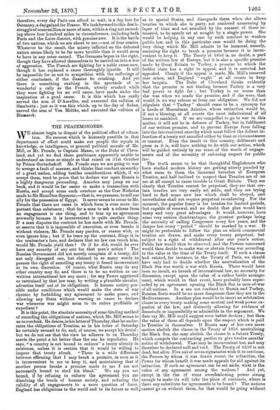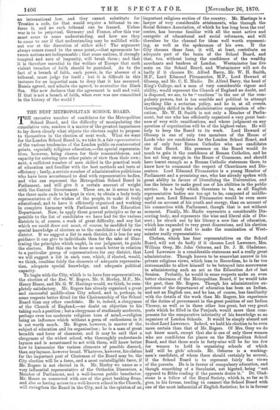THE PEACEMONGERS.
WE almost begin to despair of the political effect of educa- tion. No success which is humanly possible in that department of effort could make our people the equals in knowledge, or intelligence, or general political morale of Mr. Mill, or Mr. Fronde, or Captain Maxse, or the Duke of Cleve- land, and yet we find these gentlemen apparently unable to understand an issue so simple as that raised on 31st October by Prince Gortschakoff. Mr. Froude says we are going to war to avenge a fault of manner, and thinks that conduct unworthy of a great nation, adding besides considerations which, if we accept them, tend to prove that to declare war upon Russia is a highly dangerous proceeding. America may jump on our back, and it would be far easier to make a transaction with Russia, and accept some such overture as the Czar Nicholas made to Sir Hamilton Seymour,—that is, we presume, to sell our ally for the possession of Egypt. It never seems to occur to Mr. Fronde that there are cases in which form is even more im- portant than substance ; that for a man to ask a release from an engagement is one thing, and to tear up an agreement avowedly because it is inconvenient is quite another thing. If a man disputes the contract he has made with Mr. Fronde, or asserts that it is impossible of execution, or even breaks it without violence, Mr. Fronde may pardon, or reason with, or even ignore him ; but if he tears up the contract, flings it in the contractee's face, and declares that no law can touch him, would Mr. Fronde yield then ? Or if he did, would he ever have any security of any sort for that man's action? The Russian Government did not merely complain of a treaty, did not only disregard one, but claimed in so many words to possess the right of annulling any treaty it found inconvenient at its own discretion. Of course, what Russia may do any other country may do, and there is to be no written or un- written international law any more ; for any Power aggrieved or restrained by that law may, by writing a plausible circular, advertise itself out of its obligations. Is human society pos- sible under conditions which would make the state of war • chronic by forbidding any agreement to make peace, and allowing any State without warning or cause to declare war whenever war might seem to its rulers profitable or expedient ?
It is this point, the absolute necessity of some binding method of recording the obligations of nations, which Mr. Mill seems to us to overlook. He denies,in his letter of Thursday, that he under- rates the obligations of Treaties, as in his letter of Saturday he certainly seemed to do, and, of course, we accept his denial ; but we do not see that the view he adheres to on Thursday meets the point a bit better than the one he repudiates. He says, "a country is not bound to enforce" a treaty already in existence, unless it is certain that it would be willing to impose that treaty afresh. "There is a wide difference between affirming that I may break a promise, as soon as it is inconvenient to me to keep it, and maintaining that if another person breaks a promise made to me I am not necessarily bound to shed his blood." We say you are bound, if by refusing to enforce the agreement you are dissolving the bonds of human society, and reducing the validity of all engagements to a mere question of force. England has obligations to the world and to its future as well as to special States, and disregards them when she allows treaties to which she is party, not rendered unmeaning by lapse of time and not annulled by the consent of those in- terested, to be openly set at nought by a single power. She would be helping in any case by such conduct to weaken public law, and in this particular case would be doing the very thing which Mr. Mill admits to be immoral, namely, assuming the right to break a promise because it is incon- venient to keep it. The Treaty of 1856 is, no doubt, a part of the written law of Europe, but it is also a specific promise made by Great Britain to Turkey, a promise to which the feebler state has a right to appeal, and it is asserted has appealed. Clearly if the appeal is made, Mr. Mill's reserved ease arises, and England " ought " at all events to keep her bargain. The Duke of Cleveland thinks evidently that the promise is not binding because Turkey is a very bad power to fight for ; but Turkey is no worse than she was when we made the promise, and if she were, that would in no way release us from our obligation. We did not stipulate that " Turkey " should cease to be a synonym for a horde of Mussulman Asiatics, whose extinction would be, if not a blessing, at all events the most infinitesimal of all losses to mankind. If we are compelled to go to war in this matter, it will not be in defence of Turkey, but in fulfilment of our written promise, and to prevent Europe from falling into the international anarchy which must follow the defiant in- fraction of a treaty not annulled either by time or circumstances or consent. Even the insult to this country, deliberate and gross as it is, will have nothing to do with our action, which will be guided entirely by our sense of the worth of engage- ments and of the necessity of enforcing respect for public law.
The truth seems to be that thoughtful Englishmen who have studied modern history are getting utterly puzzled by what seem to them the incessant breaches of European Treaties, and half inclined to suspect that Treaties are of no use at all except to cause trouble to Great Britain. They see clearly that Treaties cannot be perpetual, they see that cer- tain treaties are very easily set aside, and they are trying hard to find some new law which shall be obeyed, and nevertheless shall not require perpetual re-enforcing. For the moment, the popular fancy is for treaties for limited periods, but capable of renewal, and no doubt that plan would have many and very great advantages. It would, however, have some very serious disadvantages, the greatest perhaps being the necessity of calling Congresses every few years, and the danger lest every " period " should be marked by a war. It might be preferable to follow the plan on which commercial treaties are drawn, and make every treaty perpetual, but subject to a right of withdrawal after one year's notice. Public law would then be observed, and the Powers concerned would then decide to make war or abstain from war according to the value at the time of the Treaty itself. If such a clause had existed, for instance, in the Treaty of Paris, we should have only had to decide whether the neutralization of the Black Sea was worth a war with Russia. There would have been no insult, no breach of international law, no necessity for discussion, except upon the value of a rather feeble arrange- ment, which would, in that event, have probably been super- seded by an agreement opening the Black Sea to men-of-war of all nations. In a sea not confined to Russia and Turkey, Russian fleets would be no more dangerous than they are in the Mediterranean. Another plan would be to insert an arbitration clause in every treaty making some neutral and weak power ex- positor of the law, and distinctly allowing for evidence of desuetude or impossibility as admissible in the argument. We dare say Mr. Mill could suggest even better devices ; but then the value of them all depends upon the respect which is paid to Treaties in themselves. If Russia may of her own mere motion abolish the clause in the Treaty of 1856 neutralizing the Black Sea, she may abolish the clause in a future Treaty, which compels the contracting parties to give twelve months' notice of withdrawal. That may be inconvenient too, and may therefore be declared null and void. The Treaty of 1856 is not dead, but alive. Five out of seven signataries wish it to continue, the Powers by whom it was drawn resent its refraction, the Power for whose benefit it was made appeals for aid against its infraction. If such an agreement can be set aside, what is the value of any agreement among the nations And yet, except in the rise of some overshadowing power strong enough to make its will take the place of contracts, where is there any substitute for agreements to be found? The nations cannot go on without them, for that would be going without an international law, and they cannot substitute for Treaties a code, for that would require a tribunal to en- force it, and no such tribunal can be framed. Unless war is to be perpetual, Germany and France, after this war must come to some understanding, and how are they to come to one if that understanding may be nullified with- out war at the discretion of either side ? The argument always comes round to the same point,—that agreements be- tween nations are indispensable ; that some nations, if strongly tempted and sure of impunity, will break them ; and that it is therefore essential to the welfare of Europe that such violent breaches of faith should be punished. As to the fact of a breach of faith, each power, in the absence of a tribunal, must judge for itself ; but it is difficult in this instance for an impartial man to deny that it has occurred. Russia agreed, and admits she agreed, to neutralize the Black Sea. She now declares that the agreement is null and void. If that is not a breach of faith, when ever was one committed in the history of the world ?



































 Previous page
Previous page